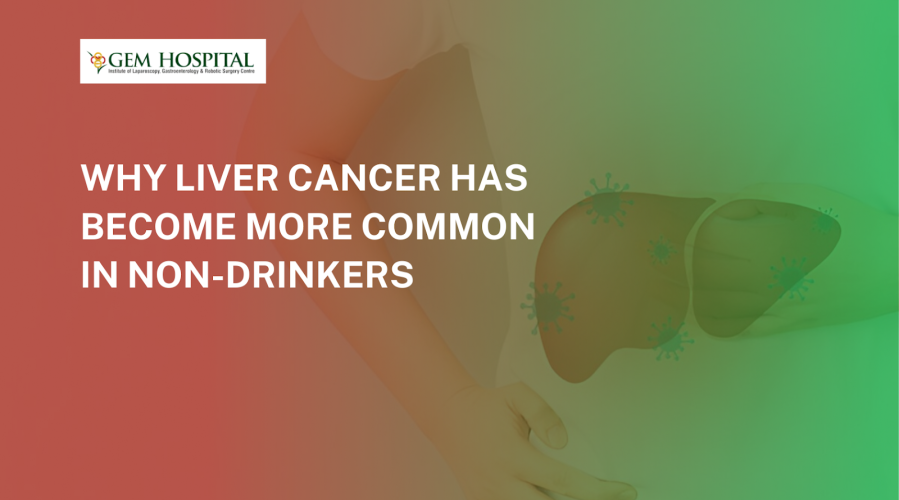Learn what gallstones are, their common symptoms, causes, and treatment options. Discover when to seek medical care and how to manage gallstone complications effectively.
Why Liver Cancer Has Become More Common in Non-Drinkers

When the ordinary person hears “liver cancer," the immediate relationship people draw is with chronic alcohol abuse. For many years there was a strong connection between excessive consumption of alcohol that lead to liver damage and cancer. For the past 10 years, doctors and researchers have noticed an emerging trend: Liver cancer is on the rise amongst people who do not drink any alcohol whatsoever
Liver cancer is rising among people who don’t drink alcohol at all.
Let's explore some of the reasons behind this new distressing phenomenon.
The Rise of Non Alcoholic Liver Cancer: What's Going On?
It used to be that liver cancer had two main risk factors to flow through; those being alcohol-related liver disease and hepatitis infections (B and C). With huge improvements to vaccination programs and general awareness of alcohol-related health concerns, it would be safe to assume that we would see a trend toward a notable decline in liver cancer cases. However, exactly the opposite is happening, especially among people who do not drink.
This shift is mainly attributable to the increasing burden of metabolic diseases.
The Silent Culprit: Fatty Liver Disease
One of the major reasons non alcoholic liver cancer is on the rise is due to Non-Alcoholic Fatty Liver Disease (NAFLD) and its more dangerous form, Non-Alcoholic Steatohepatitis (NASH).
These are liver conditions where fat builds up in the liver of people who drink little to no alcohol. This fat can cause inflammation, scarring (cirrhosis), and eventually lead to liver cancer without the person ever having touched a drop of alcohol.
Key drivers of NAFLD and NASH include:
- Obesity
- Type 2 Diabetes
- High cholesterol
- Sedentary lifestyle
- Poor dietary habits
Unfortunately, NAFLD has now become the most common chronic liver condition in the world, and India is no exception.
Lifestyle Changes Fueling the Risk
With more individuals living inactive and sedentary lifestyles, we are seeing increased prevalence of metabolic diseases, even in younger adults at a shocking rate. Junk food, sugary drinks, sedentary lifestyles, and stress all contribute to excessive fat in the liver.
The troubling part of all of this is that while there are easily measurable indicators to determine the presence of excessive fat in the liver, it is often asymptomatic until it presents with complications like cirrhosis or even liver cancer.
Even certain routine liver function tests may miss early liver damage.
Genetics and Environmental Factors
Lifestyle is a major contributor to non alcoholic liver cancer, but there are also genetic factors involved. Certain people are likely genetically predisposed to storing ectopic fat, especially in the liver. Certain individuals may also be more susceptible to certain toxic exposures from the environment, or even everyday chemicals or medications that may be toxic to the liver in high or chronic doses.
Hepatitis Without Knowing It
Chronic, low-dose exposure to ingredients in cosmetic products or pollution, preservatives, and certain over the counter or prescription medications (especially when misused) all may cause long standing exposure that can lead to significant liver burden and cancer.
Also, certain kinds of non alcoholic liver cancer are believed to be from undiagnosed or chronic viral hepatitis, like Hepatitis B or C, which may be asymptomatic, or present only dull symptoms.
Hepatitis can successfully cause significant liver damage and cancer without ever admitting to alcohol. Which is why screening for hepatitis viruses is important, even in asymptomatic individuals.
Warning Signs of Liver Cancer (Even in Non-Drinkers)
Because liver cancer symptoms often appear late, early detection is critical. Watch out for:
- Sudden, unexplained weight loss
- Loss of appetite
- Upper right abdominal pain
- Persistent fatigue or weakness
- Yellowing of the skin and eyes (jaundice)
- Swelling in the abdomen (ascites)
If you experience any of these, especially with existing metabolic conditions, seek immediate medical advice.
What Can You Do to Lower Your Risk?
Here’s how you can proactively guard against non alcoholic liver cancer:
- Manage your weight – Obesity is a key trigger for fatty liver
- Check blood sugar and cholesterol regularly
- Exercise consistently – Even 30 minutes of walking a day helps
- Limit intake of processed and sugary foods
- Avoid self-medicating with painkillers or supplements
- Get regular liver ultrasounds and LFTs if you’re in a risk group
- Screen for hepatitis B and C, especially if you’re over 40
Don’t wait for symptoms to show up
Book your appointment today at Gem Hospital and protect your health before it’s too late.
Blogs & Article
Learn about bloating and gas problems, including common causes, symptoms, and effective solutions to improve digestion, reduce discomfort, and maintain gut health.
Learn how unverified Ayurveda treatments may cause liver damage, understand the risks, symptoms, and why medical guidance is essential for safe care.


